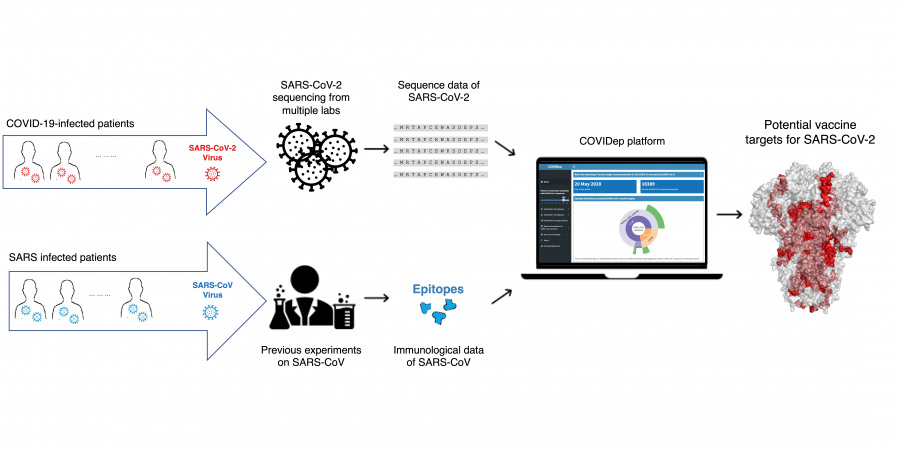HKUST Sets Up a Platform for Real-time Reporting of Vaccine Target Recommendations for COVID-19
As genetic sequences of SARS-CoV-2, the cause of the novel pneumonia (COVID-19), are similar to those of the 2003 SARS virus, SARS-CoV, knowledge and data of SARS-CoV may be useful for finding ways to combat COVID-19. Such an approach was used by a research team at the Hong Kong University of Science and Technology (HKUST) led by Prof. Matthew MCKAY, from the Departments of Electronic & Computer Engineering and Chemical & Biological Engineering, and Dr. Ahmed Abdul QUADEER, to establish a first-of-its-kind web-based platform for reporting vaccine target recommendations for COVID-19, to help scientists across the globe in the quest for an effective COVID-19 vaccine. The platform, called ‘COVIDep’, implements ideas presented by the team in an earlier study to report viral fragments, called epitopes, that can trigger human immune responses against SARS-CoV, and which also have a close genetic match in SARS-CoV-2. The identified epitopes can guide the design of vaccines for SARS-CoV-2, as they represent parts of the virus for which a robust, protective immune response may be mounted. It can also help to guide laboratory experiments for understanding the immune responses mounted by COVID-19-infected people, and to probe the immune responses triggered by existing vaccine candidates.
The new platform pools all available SARS-COV-2 sequences on a daily basis, which is over 33,000 as of June 28, and provides the scientific community with up-to-date information of immune targets (B cell and T cell epitopes) potentially capable of inducing a protective immune response against the virus. Periodically updating the system is important since SARS-CoV-2 sequences are being made available at an unprecedented rate, and the recommendation of vaccine targets is influenced by newly observed genetic variation in SARS-CoV-2. For the recommended T cell epitopes, the platform reports an estimate of the population coverage, globally and for specific regions. This can be useful for determining the percentage of individuals in a specific population that is expected to mount an immune response against an epitope, if it was to be selected as a vaccine target.
The recommendations provided by COVIDep may be used to broadly guide vaccine designs and associated experimental studies, and may help to expedite the discovery of an effective vaccine for COVID-19. Many of the vaccine, or immune, targets that are recommended by COVIDep are being supported by emerging SARS-CoV-2 experimental studies. That is, immune responses against them have been observed in blood samples taken from recovered COVID-19 patients and in some pre-clinical vaccine trials.
Prof. McKay is a Professor in the Departments of Electronic & Computer Engineering and Chemical & Biological Engineering at HKUST; Dr. Quadeer is a post-doctoral fellow in the Department of Electronic & Computer Engineering. This platform was recently published in the scientific journal Nature Protocols. For details of the platform, please visit the website https://covidep.ust.hk/.

